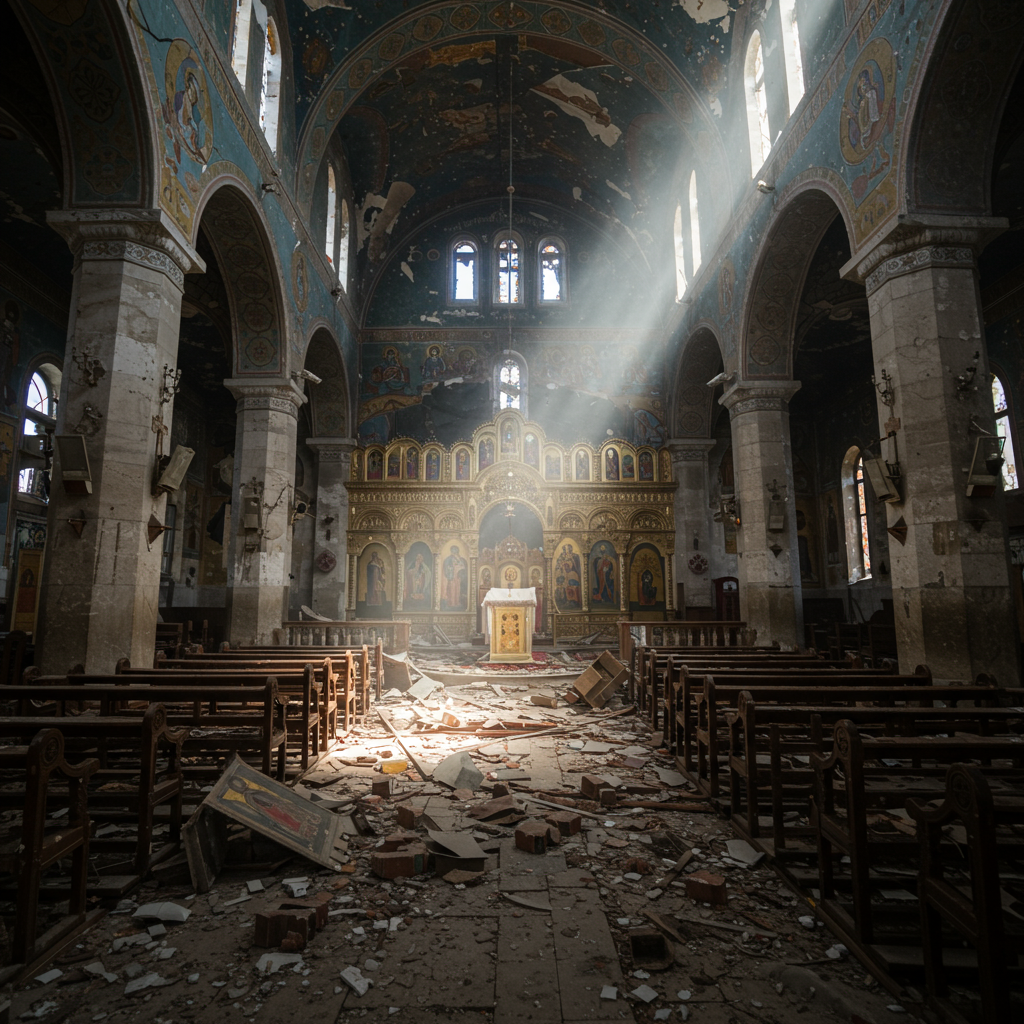Deadly Attack Strikes Packed Damascus Church Service
A devastating suicide bombing ripped through a Greek Orthodox church service in Damascus, Syria, on Sunday, June 22, 2025, claiming the lives of at least 22 people and wounding over 60 others. The attack occurred during Divine Liturgy at the Mar Elias Church in the Dweila neighborhood on the outskirts of the capital, sending shockwaves across a nation still reeling from years of conflict.
According to Syrian authorities, the assailant, suspected to be affiliated with the Islamic State (ISIS), first opened fire on the congregation before detonating an explosive vest inside the crowded church. Witness accounts corroborate this, with some describing the attacker entering armed and beginning to shoot before the blast. One witness even reported seeing a second gunman outside the church door just prior to the explosion, adding another layer to the unfolding horror. Reports indicate that congregants attempted to intervene and stop the attacker before the detonation.
The Ministry of Health confirmed the high number of casualties, noting that rescue teams were continuing to recover bodies, suggesting the death toll could rise. Among the dozens injured were reports of children. Witnesses described a scene of utter carnage, with images circulating showing blood-spattered walls, mangled pews, a heavily damaged altar, and debris scattered throughout the church interior. Security forces quickly cordoned off the area and launched an investigation into the attack.
Context: Post-Assad Challenges and Rising Tensions
This bombing marks the first known suicide attack of this scale in Damascus since a rebel coalition ousted President Bashar al-Assad in December 2024, bringing an end to over a decade of civil war. The attack underscores the immense security challenges facing Syria’s new interim government as it attempts to establish stability and unify a country long scarred by sectarian divides.
The newly formed leadership, headed by President Ahmed al-Sharaa, has publicly vowed to restore order and has sought to reassure Syria’s embattled religious minorities, including Christians, who have historically faced persecution from extremist groups. However, sectarian tensions persist.
For months, international bodies like the United Nations and officials from the United States have warned that remnants of the Islamic State are actively seeking to exploit the vacuum and transition period following the collapse of the Assad regime. Experts suggest ISIS aims to regroup, increase attacks, and potentially re-establish Syria as a hub for its operations. While Syrian authorities claim to have foiled numerous attack plots recently, some specifically targeting Christian sites, Sunday’s bombing tragically highlights the persistent threat posed by these extremist elements.
The attack also comes at a sensitive time as Syria makes tentative steps towards regaining international standing, following the recent lifting of sanctions by entities including the US and European Union.
Widespread Condemnation
The deadly bombing drew swift and widespread condemnation. Syrian officials, including the Interior Minister and Information Minister, denounced the incident as a “terrorist” and “cowardly” act that contradicts the nation’s civic values and commitment to “equal citizenship.” They pledged to combat criminal organizations and protect society while emphasizing the importance of national unity.
Internationally, the United Nations Special Envoy for Syria described the attack as a “heinous crime” and urged a full investigation, calling for Syrians to unite against terrorism and the targeting of any community. The U.S. Special Envoy for Syria condemned the act as “cowardice” inconsistent with efforts to build a more inclusive Syria and affirmed U.S. support against instability. The Greek Orthodox Patriarchate of Antioch mourned the victims as “martyrs” and called on interim authorities to assume full responsibility for protecting churches and citizens. Condemnations also came from countries including Turkiye, France, Germany, Lebanon, and Qatar.
The attack serves as a grim reminder of the ongoing struggle for peace and security in Syria and the vulnerability of minority communities in the aftermath of the civil war.




